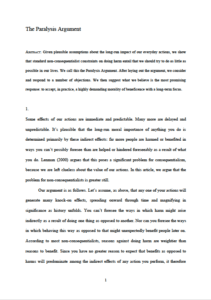The paralysis argument
William MacAskill, Andreas Mogensen (Global Priorities Institute, Oxford University)
GPI Working Paper No. 6-2019, published in Philosophers’ Imprint
Given plausible assumptions about the long-run impact of our everyday actions, we show that standard non-consequentialist constraints on doing harm entail that we should try to do as little as possible in our lives. We call this the Paralysis Argument. After laying out the argument, we consider and respond to a number of objections. We then suggest what we believe is the most promising response: to accept, in practice, a highly demanding morality of beneficence with a long-term focus.
Other working papers
Do not go gentle: why the Asymmetry does not support anti-natalism – Andreas Mogensen (Global Priorities Institute, Oxford University)
According to the Asymmetry, adding lives that are not worth living to the population makes the outcome pro tanto worse, but adding lives that are well worth living to the population does not make the outcome pro tanto better. It has been argued that the Asymmetry entails the desirability of human extinction. However, this argument rests on a misunderstanding of the kind of neutrality attributed to the addition of lives worth living by the Asymmetry. A similar misunderstanding is shown to underlie Benatar’s case for anti-natalism.
Cassandra’s Curse: A second tragedy of the commons – Philippe Colo (ETH Zurich)
This paper studies why scientific forecasts regarding exceptional or rare events generally fail to trigger adequate public response. I consider a game of contribution to a public bad. Prior to the game, I assume contributors receive non-verifiable expert advice regarding uncertain damages. In addition, I assume that the expert cares only about social welfare. Under mild assumptions, I show that no information transmission can happen at equilibrium when the number of contributors…
Crying wolf: Warning about societal risks can be reputationally risky – Lucius Caviola (Global Priorities Institute, University of Oxford) et al.
Society relies on expert warnings about large-scale risks like pandemics and natural disasters. Across ten studies (N = 5,342), we demonstrate people’s reluctance to warn about unlikely but large-scale risks because they are concerned about being blamed for being wrong. In particular, warners anticipate that if the risk doesn’t occur, they will be perceived as overly alarmist and responsible for wasting societal resources. This phenomenon appears in the context of natural, technological, and financial risks…

